Overview
Coding challenges can often hinder development processes, making it essential for developers to find effective solutions. The article focuses on essential Golang evaluation techniques that streamline these processes. One such solution is Kodezi, a tool that automates tasks and significantly enhances productivity. By integrating Kodezi into their workflow, developers can tackle common pain points in coding.
Furthermore, Kodezi offers specific features that address these challenges, such as task automation and real-time code analysis. These features not only save time but also allow developers to focus on more critical aspects of their projects. In addition, the platform emphasizes the importance of maintaining human oversight to ensure code quality amidst automation.
The benefits of using Kodezi are clear: improved productivity and enhanced code quality. Developers can achieve a more efficient workflow while ensuring their code meets high standards. Have you considered how automation could transform your coding practices? Exploring the tools available on Kodezi may provide the insights you need to elevate your development process.
Introduction
In the ever-evolving landscape of software development, developers often face significant challenges that can hinder their productivity and code quality. How can they effectively navigate these complexities? Enter Kodezi, a tool designed to enhance Golang applications through innovative features. This article explores how developers can automate OpenAPI specifications and leverage built-in evaluators for dynamic code execution.
By mastering syntax, implementing performance benchmarks, and incorporating human feedback, programmers can streamline their workflows and elevate their coding standards. As organizations increasingly adopt hybrid evaluation approaches and iterative cycles, the synergy between human insight and automated solutions becomes crucial. The integration of these elements drives continuous improvement in code quality and efficiency.
Are you ready to explore the tools available on the Kodezi platform and unlock your coding potential?
Kodezi | Professional OpenAPI Specification Generator - AI Dev-Tool: Streamline Golang Code Evaluation
Coding challenges can often hinder developers' productivity and code quality. Kodezi emerges as a powerful AI-driven tool that automates the creation of OpenAPI specifications, addressing these challenges effectively. With its intuitive interface, Kodezi allows programmers to swiftly integrate professional standards into their codebases, ensuring assessments are not only efficient but also aligned with best practices.
Furthermore, this automation is vital for developers managing complex projects, as it significantly reduces the manual effort required for documentation and evaluation tasks. Kodezi’s AI enhances modifications and automates reviews, aiding in the identification of bugs before they escalate, ultimately improving quality with each release. Tools like Kodezi are essential for enhancing productivity and ensuring high-quality programming.
However, it is crucial to maintain human oversight in development processes. This reinforces Kodezi's value in providing automated solutions while upholding professional standards. As the demand for digital transformation continues, Kodezi's capabilities in automating OpenAPI specifications and synchronizing API documentation position it as an indispensable asset for programmers aiming to optimize their workflows and elevate quality.
For those interested, Kodezi offers a 5-minute quickstart and the chance to see a demo, making it easier than ever to get started. As industry experts note, "Human eyes still need to stay in the loop to keep things on track," emphasizing the balance between automation and human oversight that Kodezi facilitates.
Utilize the Eval Function: Execute Dynamic Code in Golang
In the ever-evolving landscape of software development, coding challenges can often feel overwhelming. How can developers ensure their applications remain flexible and secure? The golang eval function provides a powerful solution, enabling programmers to execute dynamic scripts at runtime. This adaptability is crucial for contemporary applications, enabling systems to respond to changing requirements without the need for recompilation. Furthermore, the golang eval function allows developers to execute user-defined scripts or configurations, significantly enhancing interactivity and user experience. However, with great power comes great responsibility. It is essential to approach this feature with caution due to potential security vulnerabilities associated with executing arbitrary instructions. Developers must remain vigilant and informed about best practices to mitigate these risks.
In addition, tools like Kodezi can significantly enhance this process. Kodezi automatically analyzes bugs and provides corrections, allowing programmers to focus on creating secure and efficient systems. Unlike competitors such as Copilot, Kodezi functions as an autocorrect for programming, offering automatic debugging and addressing coding problems rather than merely autofilling scripts. This unique approach makes Kodezi a valuable asset for programmers across all industries.
Whether you are just starting or a seasoned professional seeking optimization, incorporating Kodezi into your processes can lead to improved efficiency and productivity. By ensuring strong security measures are established when executing dynamic code in Go applications, Kodezi helps developers navigate the complexities of modern coding while enhancing overall code quality. Why not explore the tools available on Kodezi's platform and see how they can transform your coding experience?
Master Syntax for Models: Define Effective Evaluation Policies
Mastering syntax for models in Golang is essential for overcoming the coding challenges developers frequently encounter. A clear understanding of how to structure models allows programmers to accurately represent the data and logic of their applications. By utilizing consistent and clearly defined syntax, developers can create models that streamline assessments and adjustments. Furthermore, employing accurate request and policy definitions significantly simplifies the assessment process, ensuring seamless interaction among all components. This clarity not only aids in debugging but also fosters enhanced collaboration among team members.
In addition, tools like Kodezi CLI, featuring 'AutoHeal', address these challenges by automating debugging. This allows teams to quickly identify and resolve issues, ultimately improving overall productivity. Organizations that prioritize clear syntax in their development processes have reported improved project completion rates. This underscores the impact of effective communication and structured models in software development. According to industry statistics, reducing cycle time can lead to faster project delivery, further emphasizing the importance of mastering syntax for golang eval. Best practices for defining models in Go include adhering to established syntax guidelines, which can lead to more efficient evaluations and a more cohesive team dynamic. Similarly, leveraging case studies, such as Accenture's implementation of digital collaboration tools, highlights how effective communication and structured model definitions can enhance project outcomes. By incorporating Kodezi's AI-driven automated builds and testing, programmers can guarantee their software complies with the latest security best practices and programming standards, ultimately resulting in enhanced quality. Are you ready to explore how Kodezi can transform your coding practices?
Implement Performance Benchmarks: Assess Golang Evaluation Efficiency
Establishing performance benchmarks with golang eval is essential for tackling the coding challenges developers face. By setting clear benchmarks, programmers can systematically evaluate performance with golang eval across various conditions, pinpointing bottlenecks and identifying opportunities for improvement.
Go's built-in testing and benchmarking packages facilitate seamless integration of performance tests into the golang eval workflow for development. For instance, have you considered how creating benchmark tests that mimic real-world usage situations can provide essential insights into software performance?
In 2025, golang eval will allow Go's benchmarking framework to measure performance with microsecond precision, enabling programmers to fine-tune their applications with exceptional accuracy. A notable case study on optimizing Docker images for Go applications illustrates the impact of effective benchmarking; by adopting best practices, teams achieved significantly smaller and more efficient images. This improvement not only enhanced deployment times but also elevated overall application performance.
This case study underscores how integrating benchmarking into the development process can lead to substantial efficiency gains, and experts emphasize that using golang eval in the development process is vital for long-term success. It not only enhances code efficiency but also fosters a culture of continuous improvement.
By utilizing these tools and techniques, programmers can ensure their Go applications meet the highest performance standards. Are you ready to explore how these practices can transform your coding experience?
Leverage Built-in Evaluators: Enhance Your Golang Evaluation Process
Coding challenges are a common hurdle for developers. How can you streamline your workflow and enhance productivity? Golang eval offers a collection of built-in evaluators that greatly simplify the assessment process, enabling programmers to effectively manage tasks like parsing and executing expressions. By utilizing these tools, programmers can concentrate on higher-level logic instead of getting mired in implementation details. For instance, the golang eval package facilitates the straightforward evaluation of expressions, which supports dynamic decision-making within applications. The impact of these built-in tools on programmer efficiency is profound.
A recent survey conducted by the Go team, which thanked all contributors for their input, indicated that developers value the smooth integration of Go's features. Many noted that the language's built-in concurrency support and garbage collection contribute to its exceptional speed and efficiency. This is especially advantageous for individuals moving from different programming languages, as emphasized in a case study where participants recognized the necessity for focused resources to tackle learning obstacles unique to this language.
The use of integrated evaluators in golang eval can help tackle these obstacles by simplifying intricate tasks, and in addition to the platform's built-in tools, Kodezi improves the development experience by providing automated debugging functionalities. With Kodezi, developers can quickly recognize and resolve codebase problems, ensuring that their work complies with the most recent security best practices and programming standards. This integration facilitates swift problem resolution, performance improvement, and overall enhancement of the software, rendering it an indispensable asset for Golang developers.
Furthermore, the Kodezi CLI functions as a multifunctional tool for teams, allowing them to automatically repair codebases in moments and greatly enhance programming efficiency. This Swiss-Army Knife for programmers streamlines the development process, enabling teams to concentrate on producing high-quality software without the delays linked to conventional pull requests, and expert insights reveal that utilizing golang eval built-in evaluators can result in substantial productivity improvements.
One professional Go programmer emphasized the potential of AI and machine learning to enhance productivity, particularly when systems are trained in Go best practices to catch anti-patterns and bugs effectively. This corresponds with the increasing trend of utilizing built-in evaluators in golang eval to streamline intricate evaluation tasks, thereby enhancing overall code quality. Furthermore, satisfaction levels among Go programmers remain stable across different code editors, suggesting a robust diversity in the Go ecosystem. This diversity enables developers to select tools that best suit their workflow while still benefiting from the language's robust built-in evaluators, such as golang eval.
As the Go community continues to evolve, the advantages of using these evaluators, combined with Kodezi's automated solutions, will likely become even more pronounced, making them essential for efficient development in 2025 and beyond.
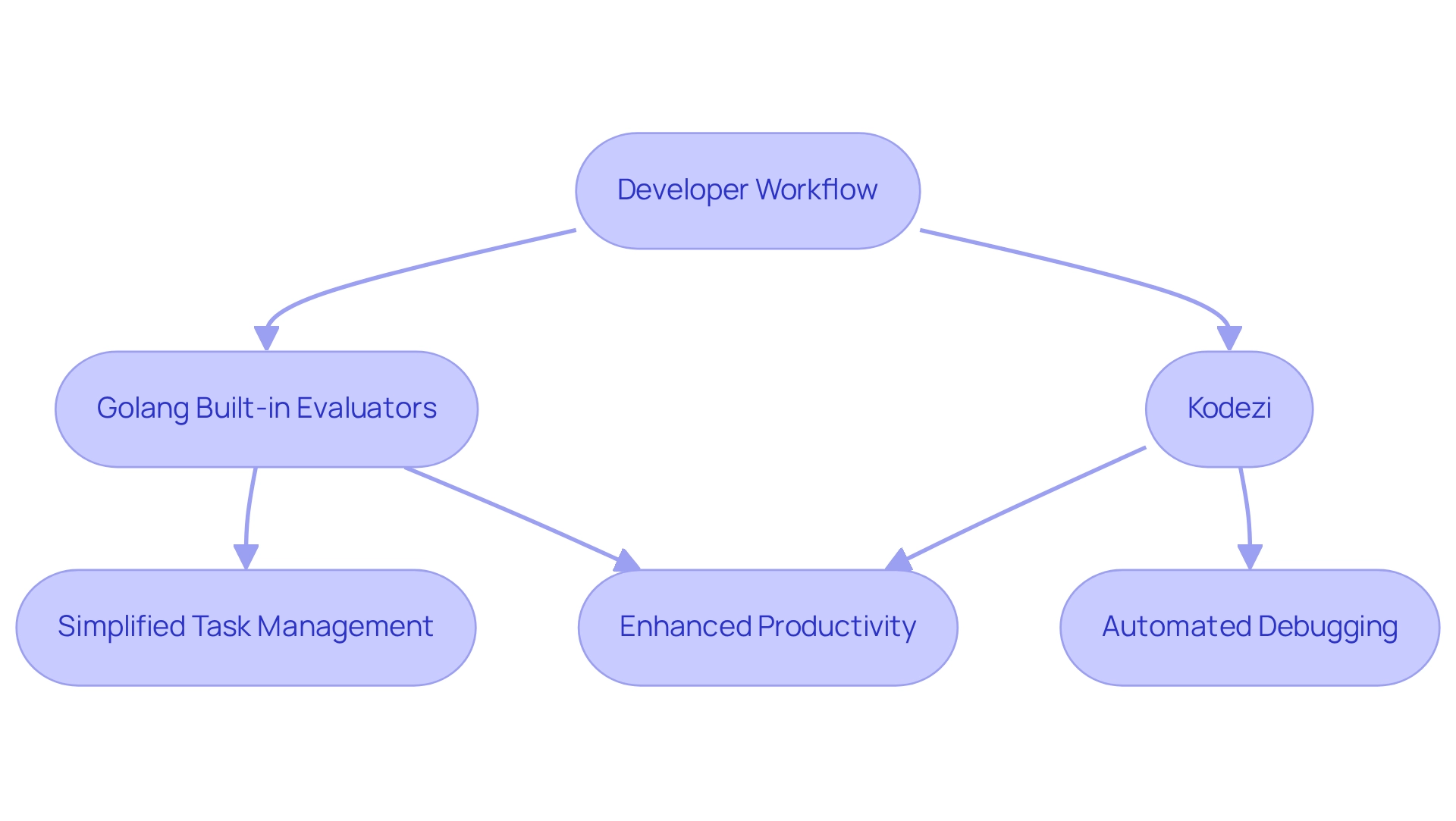
Navigate Enterprise Data Complexity: Evaluate Golang Applications Effectively
Evaluating Golang applications through golang eval within the framework of enterprise data complexity presents significant coding challenges for developers. A well-defined strategy is essential for assessing how applications will interact with extensive and varied datasets, ensuring that analyses are both thorough and efficient. Key techniques to consider include:
- Data Normalization: Streamlining data structures reduces redundancy and improves integrity, thereby enhancing evaluation efficiency.
- Indexing: Implementing indexing methods accelerates data retrieval processes, which boosts performance during assessments.
- Efficient Data Structures: Selecting appropriate data structures aligned with the specific needs of the application can significantly mitigate complexity.
- Data Visualization Tools: Utilizing visualization tools to map data flows aids in comprehending intricate datasets and identifying potential issues throughout the evaluation process.
Statistics indicate that 33% of participants expressed interest in AI assisting with documentation, underscoring the growing reliance on AI tools in software development, particularly concerning Go applications. Real-world examples reveal that organizations employing these strategies can navigate the challenges posed by data complexity more effectively, resulting in improved application performance and reliability. As Reynold Xin aptly stated, "Being a successful data engineer is not about creating complex systems, but about simplifying complex data." Furthermore, the case study titled "AI Resilience through Data Complexity" illustrates how organizations successfully navigate data complexity, offering a real-world context that supports the strategies discussed. As the landscape of enterprise data continues to evolve, embracing these golang eval techniques will be essential for programmers aiming to enhance their Go applications.
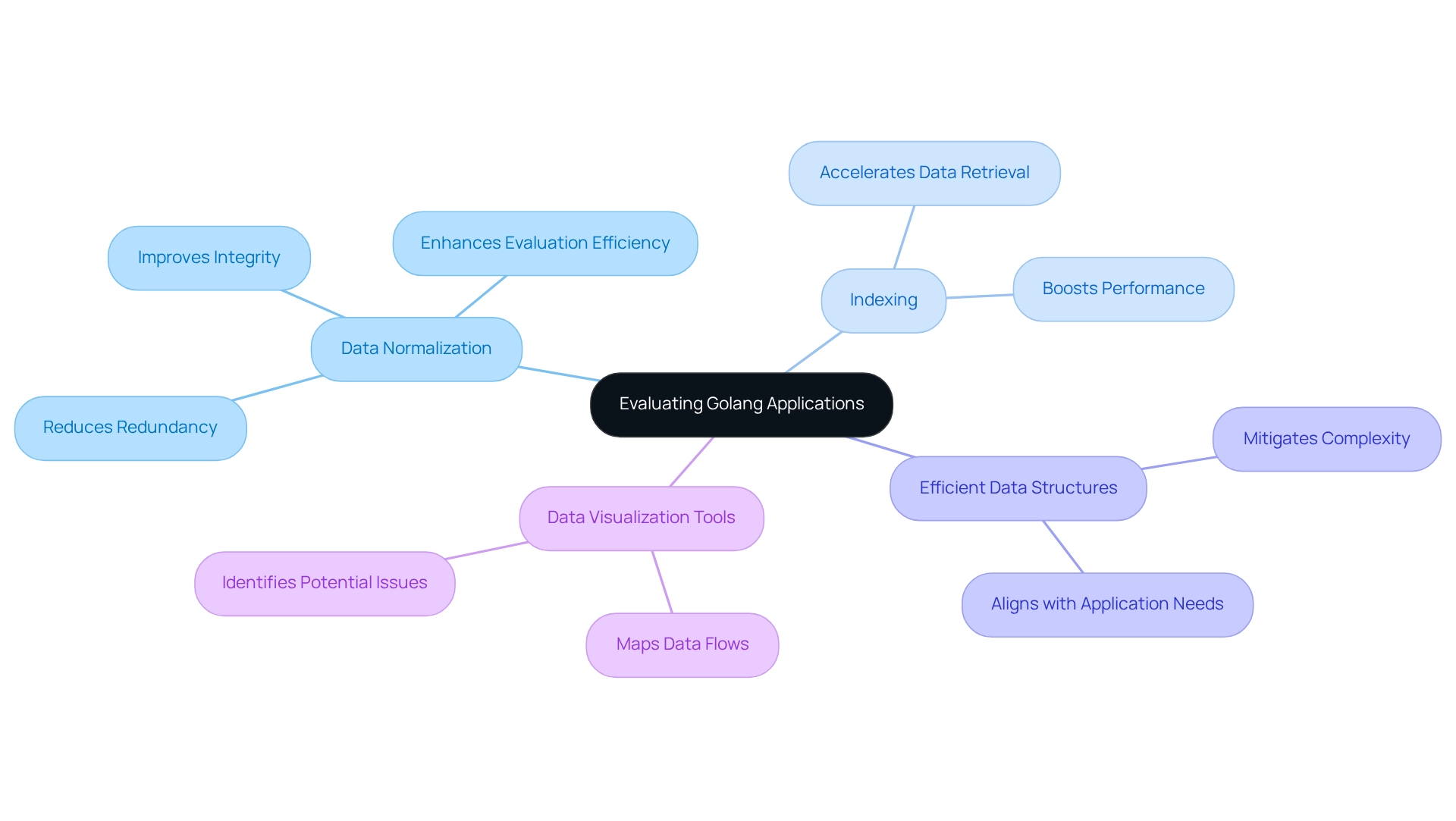
Incorporate Human Feedback: Improve Accuracy in Golang Evaluations
Integrating human input into Go assessments significantly enhances both precision and relevance. By involving users and stakeholders in the assessment process, developers can uncover insights that automated systems might miss. This approach can be effectively executed through user testing sessions, feedback loops, and iterative development practices. For instance, organizations that have embraced user feedback in their programming assessments are increasingly leveraging AI-driven analysis and hyper-personalization, leading to improved engagement and outcomes.
Real-world examples illustrate this strategy: organizations that have integrated user feedback into their Golang eval assessments report notable increases in accuracy and user satisfaction. A user from the Massachusetts Institute of Technology remarked, "Kodezi has helped me find and fix bugs faster and easier than trying to manually. It is a lifesaver when it comes to correcting issues and bugs." Additionally, statistics reveal that workers engaged in goal-setting activities are 3.6 times more likely to feel motivated, resulting in enhanced performance and more efficient assessments. This underscores the importance of engagement in driving performance outcomes.
Expert insights emphasize the critical role of human feedback in refining assessment processes. UX researchers assert that user testing not only boosts assessment precision but also fosters a deeper understanding of user needs, ultimately leading to more effective software solutions. As Pradeep from the Indian Institute of Technology Delhi expressed, "This is such a good website for debugging code, I truly appreciate the new updates every week and listening to our feedback!" Moreover, the importance of diversity and inclusion in feedback processes cannot be overstated, as varying perspectives contribute to more comprehensive assessments.
As the landscape of software development evolves, prioritizing human feedback in assessments will be essential for achieving optimal results. Future trends suggest that the incorporation of advanced feedback mechanisms will further enhance how organizations collect and respond to feedback, fostering more engaged employees and improved workplace environments. To fully leverage the advantages of user feedback, organizations should concentrate on specific features of tools like Kodezi that enhance debugging efficiency, ensuring that user insights directly inform golang eval during product development.

Utilize Context-Aware Evaluation Techniques: Tailor Your Golang Assessments
Coding challenges are a common hurdle for developers, often leading to frustration and inefficiency. Utilizing context-sensitive assessment methods in golang eval allows programmers to tailor analyses based on the unique situations of each appraisal. This approach not only ensures that evaluations are relevant but also actionable, addressing the specific needs of developers.
Furthermore, Kodezi's AI-driven automated debugging capabilities empower programmers to instantly identify and resolve codebase issues. This integration enhances performance and ensures compliance with security best practices. By directly tackling typical issues faced by programmers in Go, such as resolving performance bottlenecks and improving code quality, Kodezi stands out as a vital tool in a developer's arsenal, especially when considering golang eval.
In addition to addressing these challenges, the benefits of using Kodezi are significant. By leveraging automated debugging and performance optimization, programmers can enhance the effectiveness of their evaluations. Ultimately, this leads to improved application performance and greater user satisfaction. Have you considered how these features could transform your coding practices? Explore the tools available on the Kodezi platform to boost your productivity and elevate your code quality.
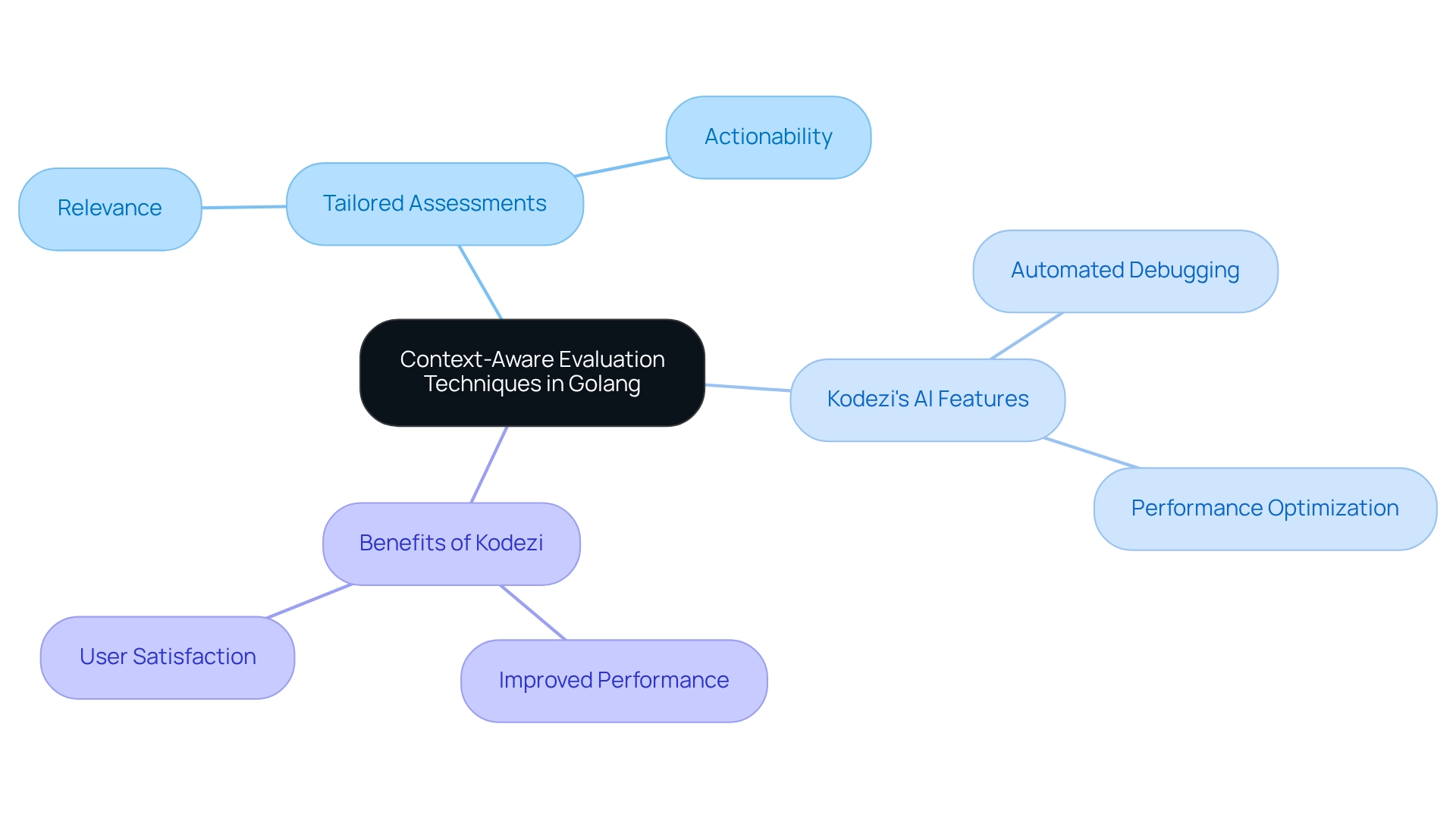
Adopt Hybrid Evaluation Approaches: Comprehensive Assessment for Golang
Coding challenges can often hinder developers' productivity and efficiency. However, utilizing hybrid assessment approaches through golang eval can significantly enhance analyses by merging qualitative and quantitative techniques. This strategy leverages the strengths of diverse assessment methods, including:
- Automated testing
- User feedback
- Performance metrics
Automated testing, particularly with tools like Kodezi CLI, swiftly identifies and resolves code issues, enhancing programming productivity and ensuring that codebases are auto-healed in seconds. User feedback provides valuable insights into usability, while performance metrics deliver crucial data on application efficiency. By integrating these methods, developers gain comprehensive insights into application performance and usability, uncovering potential issues that may remain hidden when relying solely on a single assessment technique.
Notably, studies indicate that 70.37% of participants found that adopting a hybrid approach significantly enhanced their project's productivity. This statistic underscores the practical implications of hybrid assessment methods, suggesting they not only streamline development processes but also contribute to more successful project outcomes. Furthermore, case studies like the Dragonfly Estimator illustrate the tangible benefits of hybrid methods, showcasing improved accuracy in software effort estimation through innovative techniques.
As Paolo Tell notes, "using this characterization, we develop an initial construction procedure, which allows for defining a method frame and enriching it incrementally to devise a hybrid method using ranked sets of practice." This perspective reinforces the significance of hybrid methods in crafting tailored assessment frameworks that meet specific project requirements.
By embracing these combined assessment methods, along with Kodezi's AI-powered automated builds and testing, developers can utilize golang eval to ensure their Go projects meet high standards of quality and efficiency. This approach caters specifically to efficiency enthusiasts who seek streamlined development processes. Are you ready to explore the tools available on the Kodezi platform and elevate your coding practices?
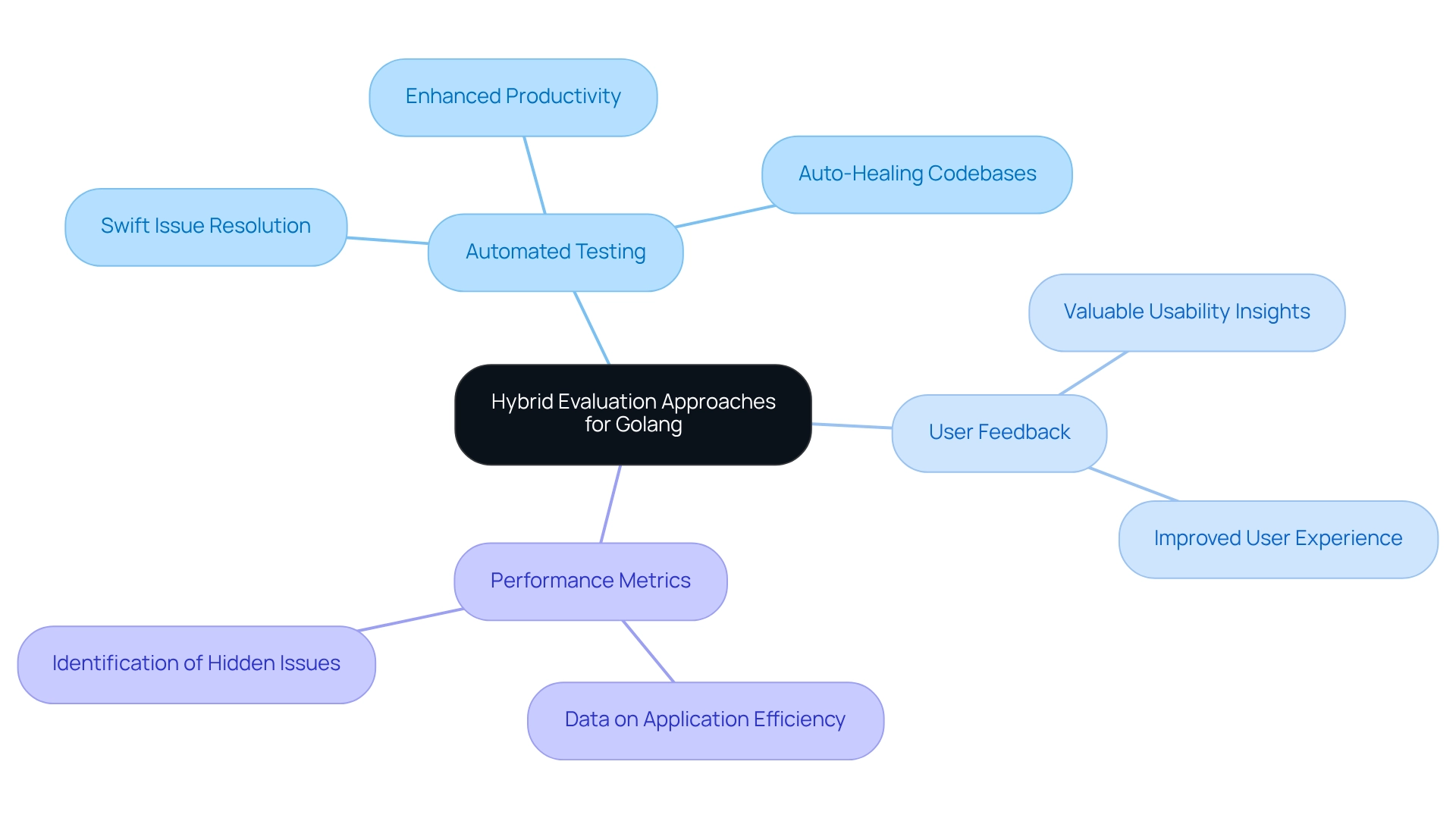
Develop an Iterative Evaluation Cycle: Continuous Improvement for Golang Techniques
Creating a repetitive assessment cycle is crucial for addressing the ongoing challenges developers face with Golang eval methods. How often do you revisit and refine your assessment processes based on feedback and performance metrics? Richard E. Pattis emphasizes that if you cannot understand the overall structure of a program while showering, you are not prepared to code it. This highlights the significance of clarity in both coding and assessment processes. By establishing a systematic cycle of planning, executing, assessing, and adjusting, developers can sustain the effectiveness and relevance of their assessment methods.
Frequent review sessions allow teams to recognize emerging trends and make data-informed choices about necessary modifications to their assessment strategies. This approach enhances adaptability and aligns with insights from industry experts like Nicole Forsgren, who emphasize the importance of collaboration between architects and engineers. Furthermore, the continuous improvement journey is more important than simply reaching the destination, reminding us that the process itself is vital.
Kodezi's CLI serves as a flexible instrument for teams, enabling them to AutoHeal codebases in seconds. This simplifies the assessment cycle and boosts programming productivity through Golang eval. With Kodezi CLI, teams can ensure they never waste time on a pull request again. Its seamless code translation functionality exemplifies practical application, empowering developers to work across various environments without extensive rewrites. Additionally, the connection between change management and continuous improvement practices underscores the relevance of iterative evaluation cycles in organizational settings.
Consider how Kodezi can transform your coding practices and enhance your team's efficiency. Are you ready to explore the tools available on the platform?
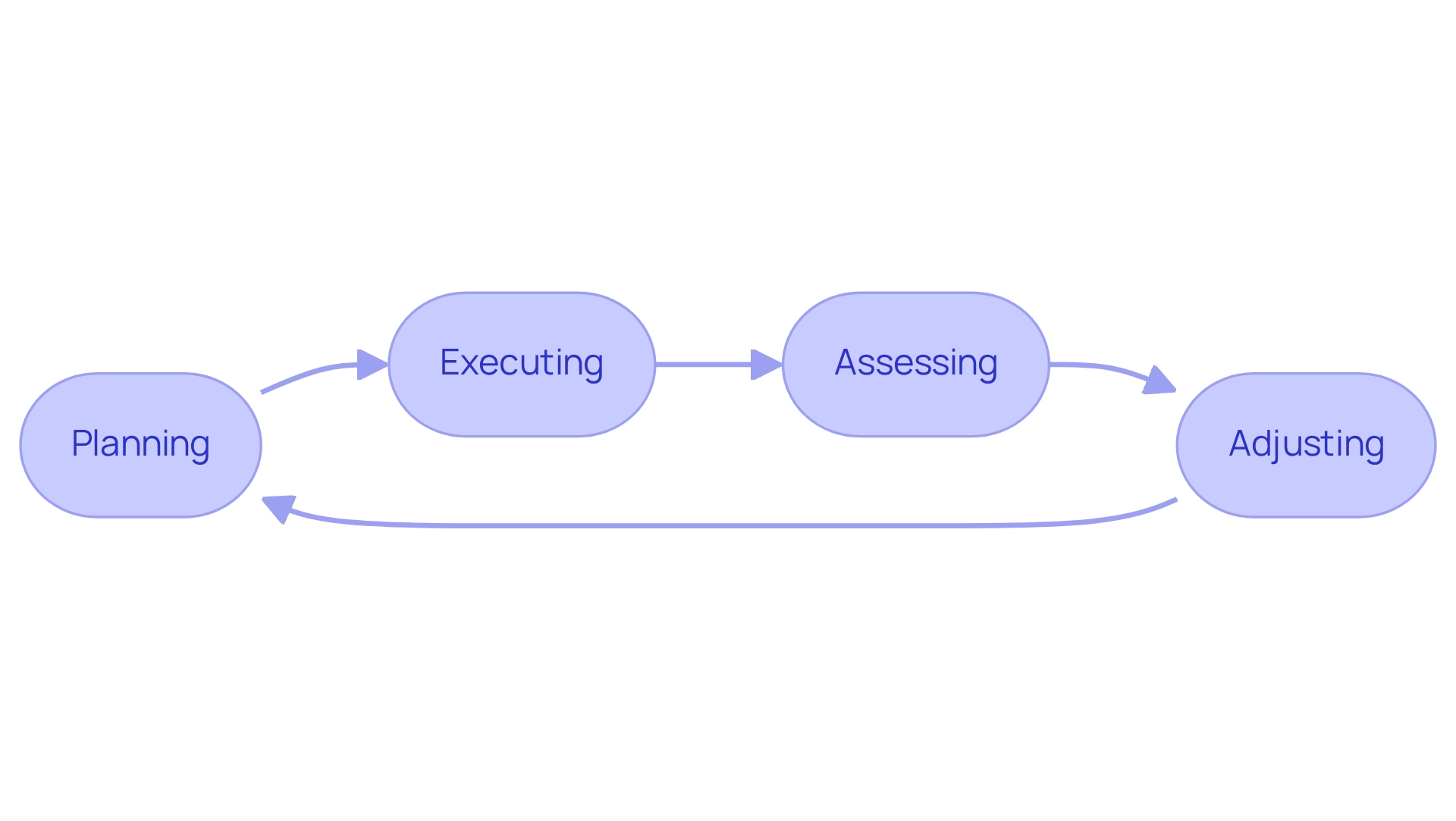
Conclusion
In the ever-evolving landscape of software development, developers often encounter significant challenges. Kodezi addresses these hurdles head-on, emerging as a transformative tool tailored for Golang developers. By automating OpenAPI specifications and streamlining code evaluation processes, Kodezi alleviates the manual workload, enabling developers to concentrate on what truly matters—producing high-quality code. With a blend of AI-driven features and the integration of human feedback, Kodezi maximizes productivity without sacrificing essential oversight.
To enhance their workflows, developers can:
- Master syntax for models
- Implement performance benchmarks
- Leverage built-in evaluators
Each of these strategies plays a pivotal role in refining evaluations, ensuring applications not only meet but exceed industry standards. Furthermore, the focus on hybrid evaluation approaches and iterative cycles cultivates a culture of continuous improvement, allowing teams to adapt swiftly to changing requirements and maintain a competitive advantage.
As organizations increasingly embrace digital transformation, tools like Kodezi will be key in shaping the future of Golang development. By merging advanced automation with the invaluable insights of human expertise, developers can ensure their applications are robust, efficient, and poised to tackle tomorrow's challenges. Embracing these strategies and tools will not only elevate coding standards but also enhance overall productivity, paving the way for a more innovative and effective development landscape.
Frequently Asked Questions
What challenges do coding challenges present to developers?
Coding challenges can hinder developers' productivity and code quality, making it difficult to maintain efficient workflows.
How does Kodezi address these challenges?
Kodezi is an AI-driven tool that automates the creation of OpenAPI specifications, allowing programmers to integrate professional standards into their codebases efficiently, thereby enhancing productivity and code quality.
What are the benefits of using Kodezi for developers?
Kodezi reduces manual effort for documentation and evaluation tasks, enhances modifications, automates reviews, and helps identify bugs before they escalate, ultimately improving the quality of each software release.
Is human oversight still necessary when using Kodezi?
Yes, maintaining human oversight in development processes is crucial to ensure that automated solutions uphold professional standards.
What features does Kodezi offer to help new users?
Kodezi provides a 5-minute quickstart guide and the opportunity to see a demo, making it easier for users to get started with the tool.
How does the golang eval function enhance software development?
The golang eval function allows developers to execute dynamic scripts at runtime, enabling applications to remain flexible and respond to changing requirements without recompilation.
What security considerations should developers keep in mind when using the golang eval function?
Developers must approach the golang eval function with caution due to potential security vulnerabilities associated with executing arbitrary instructions and should follow best practices to mitigate these risks.
How does Kodezi compare to other tools like Copilot?
Unlike Copilot, which primarily autofills scripts, Kodezi functions as an autocorrect for programming, offering automatic debugging and addressing coding problems.
What is the significance of mastering syntax for models in Golang?
Mastering syntax for models in Golang is essential for accurately representing data and logic, streamlining assessments, and enhancing collaboration among team members.
How does Kodezi CLI contribute to overcoming coding challenges?
Kodezi CLI features 'AutoHeal', which automates debugging, allowing teams to quickly identify and resolve issues, thereby improving overall productivity.




